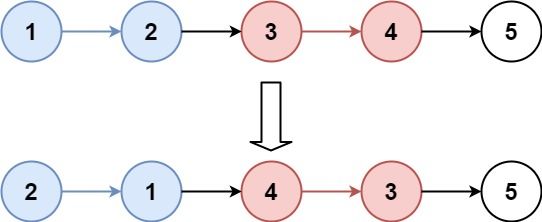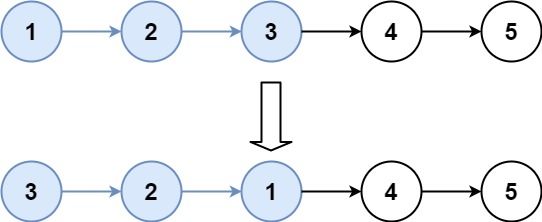Welcome to Subscribe On Youtube
25. Reverse Nodes in k-Group
Description
Formatted question description: https://leetcode.ca/all/25.html
Given the head of a linked list, reverse the nodes of the list k at a time, and return the modified list.
k is a positive integer and is less than or equal to the length of the linked list. If the number of nodes is not a multiple of k then left-out nodes, in the end, should remain as it is.
You may not alter the values in the list's nodes, only nodes themselves may be changed.
Example 1:

Input: head = [1,2,3,4,5], k = 2 Output: [2,1,4,3,5]
Example 2:

Input: head = [1,2,3,4,5], k = 3 Output: [3,2,1,4,5]
Constraints:
- The number of nodes in the list is
n. 1 <= k <= n <= 50000 <= Node.val <= 1000
Follow-up: Can you solve the problem in O(1) extra memory space?
Algorithm
To reverse a linked list in groups of size k, the process involves dividing the original linked list into several segments, each consisting of k nodes, and then individually reversing each segment. This operation necessitates two distinct functions: one for segmenting and another for reversing.
Consider the linked list 1->2->3->4->5 as an example. A common practice in linked list manipulations is to prepend a dummy node to the list. This is because the head of the list might change during the reversal process. The introduction of a dummy node ensures the head’s position is consistently trackable. Consequently, after adding a dummy node, the linked list becomes -1->1->2->3->4->5.
To reverse a group of nodes, for instance, nodes 1, 2, and 3 when k is 3, we employ two pointers: pre and next. The pre pointer indicates the node immediately preceding the group to be reversed, while next points to the node following the group. Post-reversal, the pre pointer advances to mark the new starting position for the next group reversal.
During each iteration for swapping a k-group, prev remains stationary, anchoring the start of the group being reversed, whereas current begins at node ‘1’ and moves through the group. Notably, for the duration of a single batch swap within the while (kcopy > 0) loop, prev does not shift:
Initial list: 1->2->3->4->5 , with k=3
After first step: 2->1->3->4->5
After full reversal: 3->2->1->4->5
Note: The 'next' node for 'prev' is continually updated to 'current’s next, hence 'current' remains unchanged in a single batch swap.
The time complexity is $O(n)$, and the space complexity is $O(1)$. Here, $n$ is the length of the linked list.
Code
-
public class Reverse_Nodes_in_k_Group { class Solution { public ListNode reverseKGroup(ListNode head, int k) { ListNode dummy = new ListNode(0); dummy.next = head; ListNode prev = dummy; // count total nodes ListNode tmp = head; int count = 0; while (tmp != null) { count++; tmp = tmp.next; } // 1->2->3->4->5 , k=3 // 2,1,3,4,5 // 3,2,1,4,5 // => always getting 1's next for prev's next => current (below) not changing in one-batch-swap // if only one node left, then no swap while (count >= k) { ListNode originalFirst = prev.next; int kcopy = k - 1; // @note: since current node is already counted as 1 while (kcopy > 0) { // both prev and current, not changed in while loop ListNode nextNextCopy = originalFirst.next.next; ListNode firstInGroup = prev.next; prev.next = originalFirst.next; prev.next.next = firstInGroup; originalFirst.next = nextNextCopy; kcopy--; } // @note: update previous AND current. I forgot current... prev = originalFirst; // now current is the last one of this group count -= k; } return dummy.next; } } } ////// /** * Definition for singly-linked list. * public class ListNode { * int val; * ListNode next; * ListNode() {} * ListNode(int val) { this.val = val; } * ListNode(int val, ListNode next) { this.val = val; this.next = next; } * } */ class Solution { public ListNode reverseKGroup(ListNode head, int k) { ListNode dummy = new ListNode(0, head); ListNode pre = dummy, cur = dummy; while (cur.next != null) { for (int i = 0; i < k && cur != null; ++i) { cur = cur.next; } if (cur == null) { return dummy.next; } ListNode t = cur.next; cur.next = null; ListNode start = pre.next; pre.next = reverseList(start); start.next = t; pre = start; cur = pre; } return dummy.next; } private ListNode reverseList(ListNode head) { ListNode pre = null, p = head; while (p != null) { ListNode q = p.next; p.next = pre; pre = p; p = q; } return pre; } } -
// OJ: https://leetcode.com/problems/reverse-nodes-in-k-group/ // Time: O(N) // Space: O(1) class Solution { public: ListNode* reverseKGroup(ListNode* head, int k) { ListNode h, *tail = &h; while (head) { auto prev = tail; int i = 0; for (auto p = head; i < k && p; ++i, p = p->next); if (i < k) { tail->next = head; break; } for (int i = 0; i < k && head; ++i) { auto node = head; head = head->next; node->next = prev->next; prev->next = node; } while (tail->next) tail = tail->next; } return h.next; } }; -
# Definition for singly-linked list. # class ListNode: # def __init__(self, val=0, next=None): # self.val = val # self.next = next class Solution: def reverseKGroup(self, head: ListNode, k: int) -> ListNode: ''' for reverse 1->2->3->4->5, process is like 1->None, 2->3->4->5 2->1->None, 3->4->5 3->2->1->None, 4->5 4->3->2->1->None, 5 5->4->3->2->1->None, None ''' def reverseList(head): pre, p = None, head while p: pnext = p.next p.next = pre pre = p p = pnext return pre dummy = ListNode(next=head) pre = cur = dummy while cur.next: for _ in range(k): cur = cur.next if cur is None: return dummy.next t = cur.next cur.next = None # cut from next k-group, so to reverseList() for current k-group start = pre.next pre.next = reverseList(start) start.next = t # so now 'start' is the last node of k-group pre = cur = start # same as the reset dummy before while loop return dummy.next ############ # Definition for singly-linked list. # class ListNode(object): # def __init__(self, x): # self.val = x # self.next = None class Solution(object): def reverseKGroup(self, head, k): """ :type head: ListNode :type k: int :rtype: ListNode """ def reverseList(head, k): pre = None cur = head while cur and k > 0: tmp = cur.next cur.next = pre pre = cur cur = tmp k -= 1 head.next = cur return cur, pre length = 0 p = head while p: length += 1 p = p.next if length < k: return head step = length / k ret = None pre = None p = head while p and step: next, newHead = reverseList(p, k) if ret is None: ret = newHead if pre: pre.next = newHead pre = p p = next step -= 1 return ret -
/** * Definition for singly-linked list. * type ListNode struct { * Val int * Next *ListNode * } */ func reverseKGroup(head *ListNode, k int) *ListNode { start, end := head, head for i := 0; i < k; i++ { if end == nil { return head } end = end.Next } res := reverse(start, end) start.Next = reverseKGroup(end, k) return res } func reverse(start, end *ListNode) *ListNode { var pre *ListNode = nil for start != end { tmp := start.Next start.Next, pre = pre, start start = tmp } return pre } -
/** * Definition for singly-linked list. * class ListNode { * val: number * next: ListNode | null * constructor(val?: number, next?: ListNode | null) { * this.val = (val===undefined ? 0 : val) * this.next = (next===undefined ? null : next) * } * } */ function reverseKGroup(head: ListNode | null, k: number): ListNode | null { let dummy = new ListNode(0, head); let pre = dummy; // pre->head-> ... ->tail-> next while (head != null) { let tail = pre; for (let i = 0; i < k; ++i) { tail = tail.next; if (tail == null) { return dummy.next; } } let t = tail.next; [head, tail] = reverse(head, tail); // set next pre.next = head; tail.next = t; // set new pre and new head pre = tail; head = t; } return dummy.next; } function reverse(head: ListNode, tail: ListNode) { let cur = head; let pre = tail.next; // head -> next -> ... -> tail -> pre while (pre != tail) { let t = cur.next; cur.next = pre; pre = cur; cur = t; } return [tail, head]; } -
/** * Definition for singly-linked list. * public class ListNode { * public int val; * public ListNode next; * public ListNode(int val=0, ListNode next=null) { * this.val = val; * this.next = next; * } * } */ public class Solution { public ListNode ReverseKGroup(ListNode head, int k) { ListNode dummy = new ListNode(0, head); ListNode pre = dummy, cur = dummy; while (cur.next != null) { for (int i = 0; i < k && cur != null; ++i) { cur = cur.next; } if (cur == null) { return dummy.next; } ListNode t = cur.next; cur.next = null; ListNode start = pre.next; pre.next = ReverseList(start); start.next = t; pre = start; cur = pre; } return dummy.next; } private ListNode ReverseList(ListNode head) { ListNode pre = null, p = head; while (p != null) { ListNode q = p.next; p.next = pre; pre = p; p = q; } return pre; } } -
// Definition for singly-linked list. // #[derive(PartialEq, Eq, Clone, Debug)] // pub struct ListNode { // pub val: i32, // pub next: Option<Box<ListNode>> // } // // impl ListNode { // #[inline] // fn new(val: i32) -> Self { // ListNode { // next: None, // val // } // } // } impl Solution { pub fn reverse_k_group(head: Option<Box<ListNode>>, k: i32) -> Option<Box<ListNode>> { fn reverse(head: Option<Box<ListNode>>) -> Option<Box<ListNode>> { let mut head = head; let mut pre = None; while let Some(mut node) = head { head = node.next.take(); node.next = pre.take(); pre = Some(node); } pre } let mut dummy = Some(Box::new(ListNode::new(0))); let mut pre = &mut dummy; let mut cur = head; while cur.is_some() { let mut q = &mut cur; for _ in 0..k - 1 { if q.is_none() { break; } q = &mut q.as_mut().unwrap().next; } if q.is_none() { pre.as_mut().unwrap().next = cur; return dummy.unwrap().next; } let b = q.as_mut().unwrap().next.take(); pre.as_mut().unwrap().next = reverse(cur); while pre.is_some() && pre.as_mut().unwrap().next.is_some() { pre = &mut pre.as_mut().unwrap().next; } cur = b; } dummy.unwrap().next } } -
# Definition for singly-linked list. # class ListNode { # public $val; # public $next; # public function __construct($val = 0, $next = null) # { # $this->val = $val; # $this->next = $next; # } # } class Solution { /** * @param ListNode $head * @param int $k * @return ListNode */ function reverseKGroup($head, $k) { $dummy = new ListNode(0); $dummy->next = $head; $prevGroupTail = $dummy; while ($head !== null) { $count = 0; $groupHead = $head; $groupTail = $head; while ($count < $k && $head !== null) { $head = $head->next; $count++; } if ($count < $k) { $prevGroupTail->next = $groupHead; break; } $prev = null; for ($i = 0; $i < $k; $i++) { $next = $groupHead->next; $groupHead->next = $prev; $prev = $groupHead; $groupHead = $next; } $prevGroupTail->next = $prev; $prevGroupTail = $groupTail; } return $dummy->next; } }